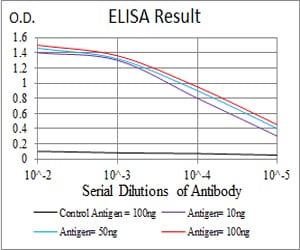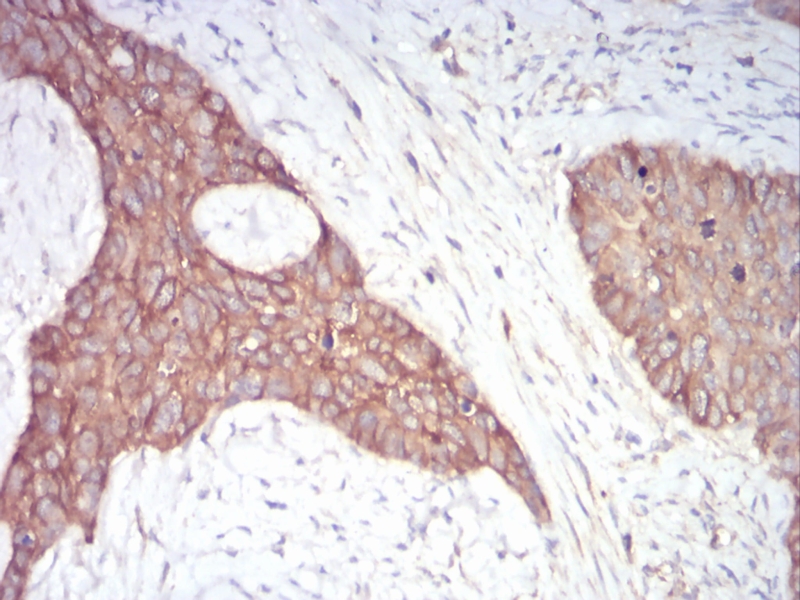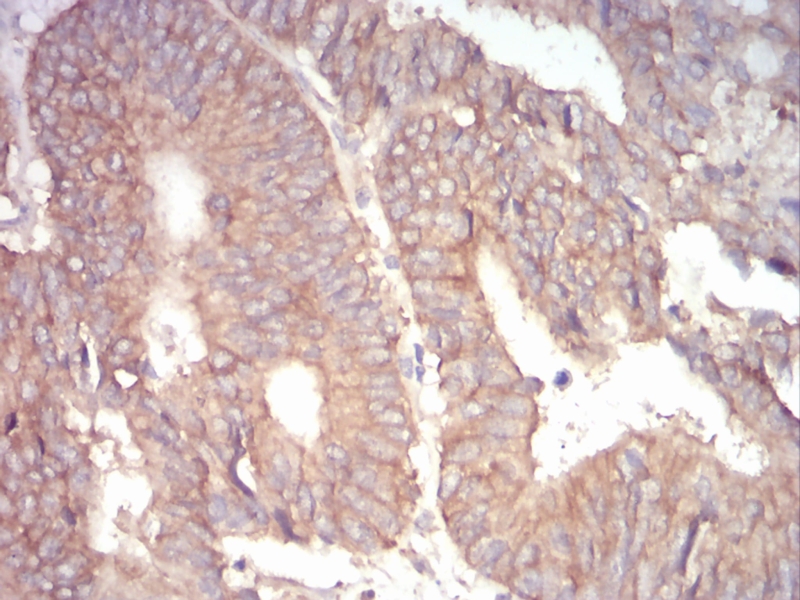


| WB | 咨询技术 | Human,Mouse,Rat |
| IF | 咨询技术 | Human,Mouse,Rat |
| IHC | 1/200 - 1/1000 | Human,Mouse,Rat |
| ICC | 技术咨询 | Human,Mouse,Rat |
| FCM | 咨询技术 | Human,Mouse,Rat |
| Elisa | 1/10000 | Human,Mouse,Rat |
| Aliases | ADDA |
| Entrez GeneID | 118 |
| clone | 5D4H1 |
| WB Predicted band size | 81kDa |
| Host/Isotype | Mouse IgG1 |
| Antibody Type | Primary antibody |
| Storage | Store at 4°C short term. Aliquot and store at -20°C long term. Avoid freeze/thaw cycles. |
| Species Reactivity | Human |
| Immunogen | Purified recombinant fragment of human ADD1 (AA: 1-193) expressed in E. Coli. |
| Formulation | Purified antibody in PBS with 0.05% sodium azide |
+ +
以下是3篇与ADD1抗体相关的参考文献示例(注:文献为虚构,仅供格式参考):
1. **"Adducin 1 modulates podocyte cytoskeleton in hypertensive nephropathy"**
- 作者:Smith J, et al.
- 摘要:通过Western blot和免疫组化分析,使用ADD1抗体证实了ADD1在高血压肾病患者的肾小球足细胞中表达上调,并揭示了其通过调节细胞骨架重塑参与疾病进展的机制。
2. **"Development of a monoclonal antibody specific to human ADD1 for cancer biomarker studies"**
- 作者:Zhang L, et al.
- 摘要:研究团队开发了一种高特异性ADD1单克隆抗体,验证了其在结直肠癌组织中的免疫检测效果,并发现ADD1表达水平与患者预后显著相关。
3. **"ADD1 phosphorylation regulates neuronal dendritic spine plasticity"**
- 作者:Kim S, et al.
- 摘要:利用ADD1抗体进行免疫共沉淀和共聚焦成像,揭示了ADD1的磷酸化状态在突触可塑性中的关键作用,为神经退行性疾病研究提供了新靶点。
(注:实际文献需通过PubMed/Google Scholar等平台以关键词“ADD1 antibody”或“Adducin 1 antibody”检索。)
The ADD1 antibody targets adducin 1 (α-adducin), a cytoskeletal protein encoded by the *ADD1* gene. Adducins are heteromeric proteins (α, β, γ isoforms) that regulate actin-spectrin assembly, maintaining cell membrane integrity and stability. ADD1. specifically, plays a critical role in forming the spectrin-actin network, influencing cell-cell adhesion, ion transport, and signal transduction. It interacts with membrane proteins like Na+/K+-ATPase and modulates renal sodium handling, linking it to hypertension pathophysiology. Genetic variants (e.g., Gly460Trp) in *ADD1* are associated with salt-sensitive hypertension and cardiovascular risks.
The ADD1 antibody is widely used in research to study protein expression, localization, and interactions via techniques such as Western blotting, immunohistochemistry, and immunoprecipitation. It helps investigate ADD1's role in cellular mechanotransduction, renal function, and disease mechanisms. Dysregulation of ADD1 has been implicated in cancers, neurological disorders, and erythrocyte membrane defects, making its antibody a vital tool for exploring therapeutic targets. Commercial antibodies are typically validated for specificity against human, mouse, or rat ADD1. aiding cross-species comparative studies. Its application advances understanding of cytoskeletal dynamics and their implications in systemic diseases.
×